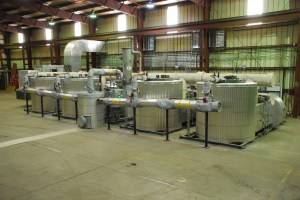 A Portland area startup selling patented systems that turn plastic trash into synthetic crude oil, Agilyx, closed a $22 million series B round, the company revealed on Thursday. The systems (image below) look like the kind of equipment you’d see in a brewery.
A Portland area startup selling patented systems that turn plastic trash into synthetic crude oil, Agilyx, closed a $22 million series B round, the company revealed on Thursday. The systems (image below) look like the kind of equipment you’d see in a brewery.
Here’s how they work, according to the company website:
Plastic feedstock, a mix of everything from grocery bags to vehicle dashboards and computer monitor cases, are dropped by a crane into a sizable vessel, where they are indirectly heated until they turn into a liquid, and then a gas.
With a series of controlled pressure and temperature adjustments, the gases are pulled through pipes into a central, condensing chamber.
There, the gases cool off, and contaminants are siphoned away. The synthetic crude oil that remains is transferred into a tank. The company can transport these tanks full of synthetic crude, and sell it to oil refineries that make it into heating oil, diesel or gas and more.

The company’s chief executive, Chris Ulum, told TechCrunch that Agilyx sells the crude it generates, through off take deals with large refineries, on behalf of those who install their systems. His was the first company to strike this type of deal, he claims. (off take agreements are reminiscent of power purchase agreements that wind and solar industry players strike with large-scale utilities.) The company also helps prospective buyers to finance their systems.
Investors in the series B round for Agilyx included: Chrysalix Energy Venture Capital, the company’s original backers, and Kleiner Perkins Caufield & Byers (KPCB) which led the round, along with Waste Management (NYSE: WM) and the investment affiliate of the global oil and gas company, Total S.A. (NYSE: TOT).
A senior vice president with Chrysalix, Brian Wawro, said Agilyx gave him tremendous hope, not just for a successful initial public offering, hopefully by the end of 2012, but also for a solution to burgeoning problems affiliated with plastic and e-waste, globally. He noted:
“Agilyx solves a huge problems on the waste side, and on the energy side.
We have all these plastics that don’t see a high rate of recycling, things like grocery plastics, shopping bags, dry cleaning bags, e-waste, auto shredder residual like dashboards and wiring from a crushed vehicle, and they’re in a single waste stream, most of the time. What you do with that? To dispose of contaminated [and mixed] plastics, now, costs about $400 or $500 a ton, to go to landfill.
Agilyx has a far more economic solution which is to not just dispose of this, but create a valuable end-use product from it — oil that is widely refinable. That’s a very attractive use of waste to everyone from municipalities, to plastic aggregators…
We’ve also talked about the possibilities of using the Agilyx system in some form — putting it on a barge — to deal with things like the Pacific Trash Vortex.”
Several major plastic gyres, or floating, gigantic masses of plastic— one in the Pacific is twice the size of Texas, according to National Geographic — pollute the ocean today.
The gyres, and plastic waste generally in the ocean harms wildlife in several ways. Animals may eat plastic particles, and can die from resulting digestive problems; they may get injuriously tangled in plastic waste; and they suffer from exposure to chemicals released by plastic waste that’s biodegraded in the water, namely BPA (bisphenol A) which disrupts their endocrine systems and negatively effects reproduction.
According to Project Kaisei, an environmental non-profit dedicated to raising awareness about waste in the ocean: “every year, over 300 million tons of plastic are produced, much of it for one-time, disposable use, and roughly 90% never makes it to be recycled.”
So far, all of Agilyx installations have been terrestrial. On land, the company faces a challenge in scaling to the mass market— it must obtain permits, state-by-state in the U.S., proving air emissions from its processes are safe. Agilyx obtained its first such permits in Oregon. Ulum said his company has four pending projects in California, and he expects at least the largest of these to be permitted soon, and operating in full by the end of 2011.
Other plastics waste to energy companies — like Polymer Energy, LLC in Minnesota, or Envion in Washington D.C. — face the same regulatory scrutiny.
Plastics to fuel companies also compete with, when they’re not supplementing the work of, more traditional recyclers, incinerators and land fill businesses, as well as companies that tout the benefits of plant-based plastics, which are not as easily processed and converted back into synthetic crude.